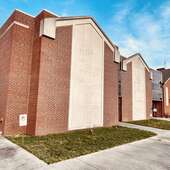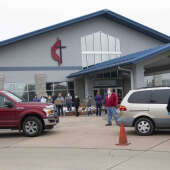An ‘exciting’ time for Missouri broadband, says state director BJ Tanksley

“Fast and furious,” is how the state director of the Office of Broadband Development (OBD), BJ Tanksley, describes the current activity around broadband development in Missouri.
Tanksley, a 2002 Cape Girardeau Central High School graduate, is also a 2006 alumnus of Southeast Missouri State University.
The state broadband office has had two directors in its existence and both have local ties.
Tanksley’s predecessor, Tim Arbeiter, now working in private industry, the inaugural director of OBD, has the same Cape Central-SEMO pedigree.
“I think it’s kind of cool that we’re both from Cape and [Tim and I] have a history,” said Tanksley, who noted his previous collaboration with Arbeiter while working on broadband issues for Missouri Farm Bureau.
Broadband “Summit”
As this story was sent to press, Tanksley’s office was about to participate in a “Connecting All Missourians” one-day Oct. 4 conference in Jefferson City, called a “summit,” said to be the kickoff of a statewide listening tour aimed at “funding lasting investments for broadband infrastructure and measures to promote broadband adoption such as digital inclusion,” according to an invitation email received by broadband stakeholders in late September.
The tour is funded through the federal Broadband Equity, Access and Deployment (READ) program and by the Digital Equity Act (DEA).
“Connecting All Missourians” is funded through the Federal Broadband Equity, Access, and Deployment (BEAD) program and the Digital Equity Act (DEA).
“[This is] an unprecedented opportunity to connect unserved and underserved Missourians. These programs will fund lasting investments for broadband infrastructure and measures to promote broadband adoption such as digital inclusion,” said Tanksley’s office, adding at press time, there were no specific dates set for the listening tour to come to Southeast Missouri.
“It’s been an exciting time with the
governor focused on [broadband] infrastructure,” said Tanksley, who assumed his current role in January.
State of the State
In Gov. Mike Parson’s Jan. 19 “State of the State” address to the state General Assembly, broadband was specifically highlighted for a proposed significant investment of money.
“We are proposing $400 million to further increase broadband, the largest single investment in our state’s history,” said Parson, who succeeded Eric Greitens as governor on June 1, 2018.
“This investment will increase access across Missouri for rural areas but also underserved urban areas. With this plan, we will connect 75,000 households with high speed broadband and invest $30 million toward constructing and upgrading cell towers to expand wireless networks across the state. This is another core investment we are making for the next generations and for the future of our state.”
Definitions
The Federal Communications Commission (FCC) defines broadband internet as “a minimum of 25 megabits per second (mbps) for downloads and three megabits per second (mbps) for uploads. Broadband provides high speed internet access via multiple types of technologies — including fiber optics, wireless, digital subscriber lines (DSL) and satellite.”
Tanksley added further definitions.
“Unserved means anybody without access to 25 mbps by three mbps service and underserved refers to areas without access to 100 mbps by 20 mbps. We’re prioritizing the unserved [in Missouri] first, because we know there’s a lot of those,” he said.
Tanksley said a trio of municipalities in the state have launched their own broadband departments — Houston, Marshall and Springfield.
Economic development
Jackson Chamber of Commerce executive director Brian Gerau, whose portfolio includes seeing new business relocate to the county seat of Cape Girardeau County, is bullish on expanding broadband, saying industry leaders considering Jackson for a future location are demanding widespread broadband coverage.
“[Broadband] is always on their minds and is among their top three requirements for coming here,” said Gerau, adding “broadband is a huge economic development tool.”
Gerau, Jackson’s chamber leader for nearly 14 years, added that bringing free Wi-Fi to uptown Jackson remains on his personal wish list.
Gerau’s counterpart, Cape Girardeau Area Chamber of Commerce president and CEO Rob Gilligan, acknowledged there are pockets of areas in Cape Girardeau County without broadband.
“I think access to high-speed broadband today is the same need and requirement for growth as access to electricity was 100 years ago,” said Gilligan, a Kansas native who succeeded John Mehner as leader of the Cape Girardeau Chamber in April.
“It is such a critical piece for business operations moving forward, whether we’re talking manufacturing, health care, tech-based operations,” he added, noting widespread broadband is “a quality of life” issue because having a fast and available internet connection adds to the region’s ability to attract personnel to live and work locally.
Providers
Craig Unruh, president of AT&T Missouri, told B Magazine he applauds the effort Missouri officials are making to get broadband to everyone.
“Every Missourian should be connected to the internet and [AT&T Missouri] is doing its part to make it so. The pandemic put a huge exclamation point on this need. At our company, we’re expanding and upgrading our networks to provide the fast and reliable internet access people need. We’re working closely with state and local governments as they identify opportunities to build out broadband networks to help close the digital divide,” Unruh said.
According to a white paper for Fiber Broadband Association, people in nonmetropolitan areas need access just as much as those in more populous areas.
“The lack of adequate high speed broadband availability in rural areas has been a persistent challenge in North America for many years,” the document read.
“The challenge exploded in importance as the pandemic forced nearly all interactions to be conducted from the home, further exposing the insufficiency of the broadband available in many rural areas. The result is lower productivity, lagging education, declining economic development opportunities and poorer health outcomes for rural residents. The rural high-speed broadband availability divide must be closed.”
Kevin Cantwell, president of Cape Girardeau-based Big River Telephone, launched Circle Fiber — offering broadband services to Jackson, Poplar Bluff and north Cape Girardeau.
“Without broadband, no business is going to put one of its locations in an unserved area. No new business will go in without broadband. Technology is the driver. I hear this every day from business. I hear it every day from real estate agents,” Cantwell said.
What’s next
In late September, applications closed for $265 million General Assembly-approved infrastructure grants for broadband from the state’s American Rescue Plan Act federal allocation.
“We have gotten approximately 160 applications. We’ll rank [the applications], vet them and ultimately fund them and we’re announcing funding levels toward the end of December,” said Tanksley, who added the grant requests vary from $100,000 to $10 million.
“We’re trying to make sure we’re putting this into areas unserved by broadband. The provider community is bringing some matching dollars and some local governments are also partnering with them.
Missouri ranking
Tanksley said Missouri ranks no. 34 out of the 50 states in terms of broadband access.
“Yes, I think we are in that lower third of states but the good news is we’ve been moving up. Not long ago, we were no. 42. We’ve been making positive momentum and I think that’s going to continue.”
Opportunity
“We have an awesome chance with this ARPA funding in the very near future. We also have money coming from the Infrastructure Investment & Jobs Act. You put those two funding sources together and we really have a chance to make an impact across the state. We’ll be touring around the state for six months to hear from individuals about their experiences related to broadband access. We can’t wait to get out there and hear from Missourians,” said Tanksley, whose OBB office has 10 employees with plan to add two more.
































Respond to this story
Posting a comment requires a subscription.